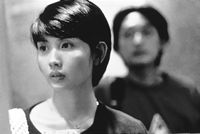
|
 |
Hold
You Tight
|
HONG
KONG / 1998 / Cantonese, English / Color / 35mm (1:1.85) / 96 min
Director: Stanley Kwan
Screeenplay: Jimmy Ngai
Photography: Kwan Pun-Leung
Editor: Maurice Li
Production Designer: Bruce Yu
Cast: Chingmy Yau, Sunny Chan, Eric Tsang
Producer: Raymond Chow
Production Company: Kwan's Creation Workshop
No. 15, 1/F, LionRock Rd., Kowlooncity, Kln., HONG KONG
Phone: 852-2383-0267 / Fax: 852-2794-3709
Source: Pony Canyon Inc., Omega Project Inc.

|
|
Stanley
Kwan

Film director. Born in 1957 in Hong Kong. After studying communications
at Hong Kong Baptist College, Kwan joined a television station as
an apprentice actor. He soon moved to the production division and
worked as an assistant director for Ann Hui, Yim Ho, and other directors
who would become New Wave Hong Kong cinema. Kwan directed his first
feature, Women ("Nuren Xin") in 1985. He was soon recognized
as one of the leading film directors in Hong Kong known for sensitive
portrayals of female characters. In 1991 his film Actress ("Ruan
Ling Yu") won actress Maggie Cheung the Silver Bear for Best
Actress in the 1992 Berlin Film Festival. After Red Rose, White
Rose ("Hong Meigui Bai Meigui") he temporarily withdrew
from feature filmmaking and devoted himself to theater projects, experimental
shorts, and documentaries, Yang +/- Yin: Gender in Chinese Cinema
("Nan Sheng Nu Xiang," 1996), and A Personal Memoir of
Hong Kong: Still Love You After All These ("Nian Ni Rushi,"
1997), screened as a Special Invitation Film at YIDFF '97. This last
film permitted him to examine his own roots and sexual identity. Many
regard his 1998 film Hold You Tight as indicative of a new
direction in Kwan's career. He is currently working on Tale of an
Island, as part of "Y2K" project, a joint venture with Edward
Yang and Iwai Shunji. |
Hong Kong, 1997. A mainland-born computer software designer and his
wife. A Taiwanese boy who feels a strong and inexplicable attraction
to the programmer but ends up making love to his wife. Then there
is an affable gay Hong Kong-born real estate agent. The Taiwanese
boy returns to Taipei and meets a woman who looks exactly like the
programmer's wife. All these lives intertwine. Images as fragments
of lives are freed from melodramatic chronology and put together following
the protagonists' emotions. After experience in theater, with experimental
shorts, and making two documentaries which allowed him to look back
to his own roots and identity, Stanley Kwan has attained an astonishing
simplicity, frankness and honesty in describing modern people confused
with their love: each of them trying to see him/herself as he/she
really is—to regain peace, a relationship with oneself as well
as with others. It is also a spiritual, and phychological document
about what Hong Kong's 1997 historical transition has meant to its
people.
Juror's
Statement
Last Year I had a wonderful experience in Israel as a member of the
jury for the Jerusalem Film Festival. The documentary films I saw
there were a revelation—fascinating subjects and innovative forms
of expression by young filmmakers. As I watched these films, it struck
me that I had missed two things during all my years of directing films.
First, I realized how under-informed I am about what's going on in
different parts of the world. Directors like me who most often make
fiction films find it all too easy to narrow our focus down to the
worlds we create on screen. It's always salutary to be reminded that
there is a real world out there.
Second, I realized how our energy level changes as time goes by. It's
not at all unusual to find new and inspiring elements in work by young
filmmakers. But the creative energy which young filmmakers bring to
their work can all too easily diminish with time, often without the
filmmaker him/herself even being consciously aware of it. If someone
asked me to film Love Unto Waste again now, I probably wouldn't be
able to do it in the way I did when I made that film in 1986. It's
invaluable for an experienced, practiced director to be confronted
by new and inspiring ideas from younger talents.
My experiences in Jerusalem broadened my vision and helped me to reassess
myself as a filmmaker. I hope and expect that the Yamagata International
Documentary Film Festival will give me similar experiences, and I
hope that everyone who attends the festival will feel as I do about
the work of young documentarists today. |
  |
|
before  next next
|
COPYRIGHT:Yamagata International Documentary Film Festival Organizing Committee |